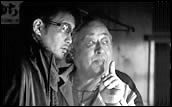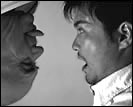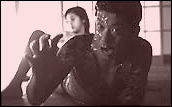Gozu
- Year
- 2003
- Original title
- Gokudo Kyofu Daigekijo Gozu
- Japanese title
- 極道恐怖大劇場 牛頭
- Director
- Cast
- Published
- 21 May 2003



by Tom Mes
In 1996, Takashi Miike made a film for the Japanese video market that its distributor had the good sense of releasing theatrically instead. It's a good thing they did, because the film went on to become the director's first work screened at an overseas film festival. The film was Fudoh: The New Generation, the festival was Toronto, and the results were a place in Time Magazine's top ten films of the year, a US video release, and the world's introduction to a very unique filmmaker.
Seven years later, and Miike has directed another straight-to-video film. And again it shows up at a foreign festival. This time though, there is no theatrical release to thank for its selection. In fact, there was no release whatsoever. Not scheduled to hit Japanese video shelves until two months later, Gozu found itself in the Director's Fortnight section of no less an event than the Cannes Film Festival in May of 2003. If anyone still had doubts about the merits of V-cinema, they could safely abandon them.
Written by Ichi the Killer's Sakichi Sato, Gozu is less a transgressive bloodbath than an utterly bizarre excursion into almost Lynchian realms of post-logic. It's a film that will no doubt go down well with fans of Higuchinsky's Uzumaki, with its weird phenomena, thoroughly unpredictable storyline and detachment from genre. Pitting a virginal yakuza trainee against deranged suburbanites, a cow-headed demon, and his own id, this is the film Hideaki Sunaga's Getting Wild With Our Monkey hoped to be.
Minami (Hideki Sone) is underling to yakuza Ozaki (Sho Aikawa), a man whose increasingly erratic behaviour is beginning to worry his superiors. When Ozaki interrupts a gang meeting to voice his concerns that the diminutive Chihuahua staring through the window has been sent to kill them - and then proceeds to take some drastic security measures against the fluffy canine - his boss decides it's best to get rid of him. The task befalls Minami, who is sent out by car to the yakuza disposal dump in Nagoya with an unsuspecting Ozaki in the back seat. Tormented by the dilemma of having to kill his own beloved senior, Minami is a ball of nerves when he does the job entirely by accident; suddenly hitting the brakes, he causes Ozaki to slam his head hard against the front seat and break his neck.
Now at a complete loss, he pulls up to the nearest roadside coffee shop to find a phone, but when he returns he finds that Ozaki's body has disappeared from his car. Did somebody steal it or did the yakuza just get up and walk away by himself? Minami goes off on a desperate search, but a flat tyre gets him stranded almost immediately. To make matters worse, everybody in this particular suburb seems to have more than a few screws loose, from the cross-dressing coffee shop owner and the American sake vendor who literally reads his Japanese lines from cue cards, to the autistic innkeeper and his excessively lactating (yes, one of those again) sister. If that wasn't enough, a mysterious but gorgeous young woman emerges in the back seat of his car, who knows all Minami's darkest secrets - secrets he only ever told Ozaki.
More than a parade of distorted and outlandish characters, Gozu's descent into the grotesque is above all the manifestation of the protagonist's confusion. The deeper Minami wades into the quagmire of weirdness, the more we as viewers get to know about his personality, in particular his insecurity about his sexual identity and his devotion to Ozaki. It's a mix of these two elements that is at the heart of the proceedings, which more than once seem suspiciously Freudian; the actual descent is into Minami's own subconscious.
Peculiarities aside, Gozu is a good example of Miike's fierce loyalty to his actors. The film is a veritable who's who of Miike movie alumni, starting with lead actor Hideki Sone, who first worked with the director in 1996, heading the cast of the ersatz ninkyo eiga Jingi Naki Yabo and its sequel. More recently he appeared in supporting roles in Agitator, Graveyard of Honour and Deadly Outlaw: Rekka. Sho Aikawa of course needs little introduction after his turns in the Dead or Alive series (as well as Rainy Dog, Ley Lines, and Shangri-La). Tetsuro Tanba, playing the owner of the yakuza disposal business, has also become a Miike regular since playing the crow-hunting grandpa in The Happiness of the Katakuris, while diminutive film critic Tokitoshi Shiota (here unrecognisable as the titular cow-headed demon) has been a longtime Miike supporter and collaborator, best known for playing the singing suicide case in the aforementioned madcap musical. Other regulars show up in bit parts, meaning Miike fans will have a delightful time spotting familiar faces.
There is little precedent for the far out, and at times riotously funny, Gozu in Miike's previous work. This shows that while the director continues to crank out films at an alarming rate (and unbelievably it's an ever-increasing rate: a record number of nine Miike films were released in 2002!), there is still no end to his creativity and inspiration in sight. Whatever your impression of this director might be, Gozu is guaranteed to change it completely.